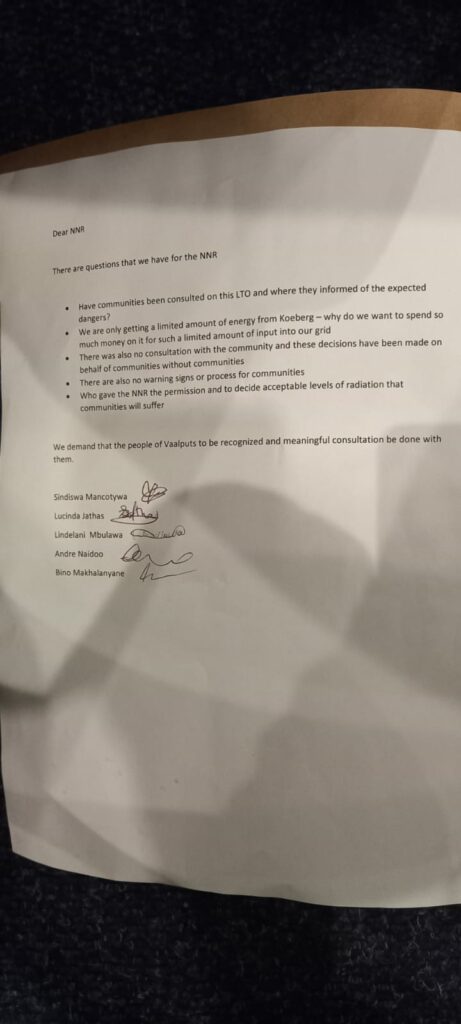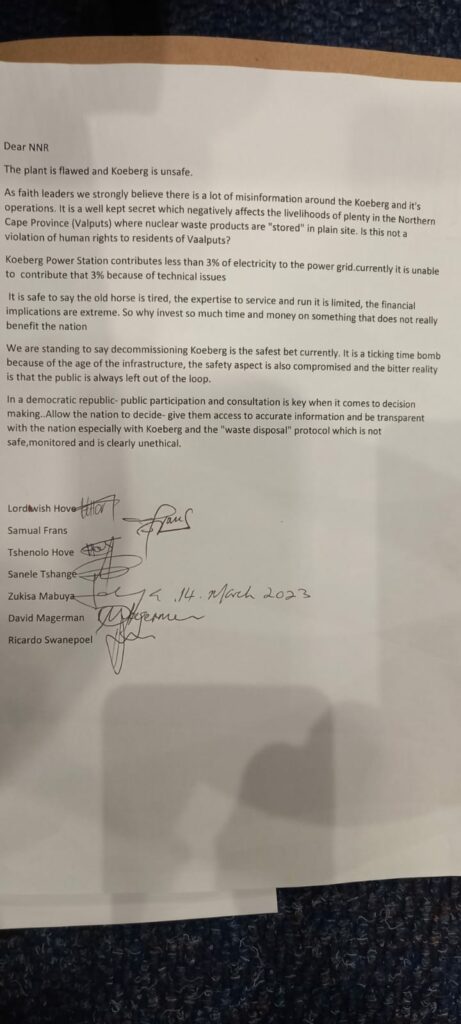Faith communities oppose proposal to extend the lifespan of the Koeberg Nuclear Power Plant
- Published:
Yesterday (16 March) was the deadline for public comment on Eskom’s proposal to extend the life of the Koeberg Nuclear Power Plant by another 20 years. The Southern African Faith Communities’ Environment Institute (SAFCEI) and faith leaders from around the country have been encouraging people to have their say, making their own submissions. A group of faith leaders traveled to the Koeberg Nuclear Power Plant (KNPS) on 15 March, where they had a chance to talk with KNPS officials as well as the National Nuclear Regulator (NNR) about their concerns.
“People of faith, especially those in leadership roles, have a critical role to play in holding our governing structures accountable and in encouraging their communities to do the same,” says Wayne Du Plessis, SAFCEI’s Energy and Climate Justice Manager.
According to SAFCEI, the lack of information for the safety case for the Koeberg lifespan extension is a major obstacle to proper public involvement. There are also several issues affecting the feasibility of a life extension of this aging nuclear power plant. Most notably are ongoing problems at Koeberg, which have persisted over the past few years and include concerns about the condition of the containment buildings that protects people from radioactivity. This issue is further exacerbated by the fact that to refurbish a nuclear power station parts that cannot be replaced without weakening the integrity of the structure. Then there is the unreliability of the grid and the potential for a grid collapse (due to loadshedding). Add to that the persistent allegations of corruption in Eskom, which many see as the catalyst to South Africa’s almost-collapsed energy sector.
Lydia Petersen, a faith leader from Mitchells Plain Cape Town says, “Should the Koeberg lifespan be extended for another 20 years, we will be saddled with nuclear waste for which there is no permanent solution. Communities have not been adequately informed about this or the associated risks, which makes the processes involved unconstitutional and totally flawed. The cart has been put before the horse in this case because there are sections that have not been made transparent in the consultation process. This makes it difficult for communities to have an informed opinion about the extension.”
Lindelani Mbulawa, an African Traditionalist and a Christian from the Eastern Cape says, “We have not been adequately educated about what extending the lifespan of Koeberg would mean for us as a people and the environment. We are already struggling with global warming, and we are looking for greener alternatives that will be good for our environment and ourselves. There was life before nuclear energy and there will be life after it. I am totally against this extension because we have no need for these plans that have divided our society and will most probably only benefit those with money, in suburbs and not us in the rural areas.”
Rev Gwen Mvula, based in Alice Eastern Cape, of the Anglican Church of South Africa says, “I am very sceptical about this extension because I view this as a waste of resources; Eskom has no money. Now the President has appointed a Minister of Electricity, another waste of money that could have been utilized in solving our energy crisis. In my view, renewable energy is our best option as a country because it is more cost effective than an unsafe Koeberg that will likely cost us more millions, in the long run. We need to remain conscious of the fact that South Africa has no money. And as a nation with a big majority living in poverty, we should prioritise more affordable and safe alternatives that are more likely to offer more inclusive solutions.”
Rastafarian from Gqeberha, Ricardo Swanepoel says, “Koeberg’s lifespan should not be extended because it raises too many concerns about safety standards and public (and workers’) exposure to harmful nuclear materials. From what I have learnt, it would take an enormous amount of money to safeguard that facility. The Earth and its fullness belong to the Lord. We therefore cannot allow the plant life extension because of the growing threat to human and environmental wellbeing from the increase in high-level radioactive waste stored at the plant and for which there is no permanent solution.”
Sanele Tshange from Mount Fletcher Eastern Cape says, “Koeberg is not safe and if not decommissioned by its due date, the deterioration of the containment structure and issues associated with the increase in high-level radioactive waste being stored at the site, could result in a serious public health issue. The fact is, there is no safe, permanent solution for disposing of this very toxic waste. Furthermore, the way Eskom has failed us as a country makes me want to go back to the way the older generations lived, in an environment that was not harmful to them. In this day and age, we need our power producers to make more effort to use natural, environmentally-friendly alternatives to generate electricity.”
Andre Naidoo from the Cape Flats in Cape Town says, “Modern civilisation is moving extremely fast in nuclear technologies while exploiting natural resources and dumping nuclear waste where it will harm people. How can this be Godly? For me, this is what is most worrying about this situation.”
“During a three day workshop this week, which is a part of SAFCEI’s Energy Advocacy and Skills Building workshops and jointly facilitated with The Green Connection, people of faith are expressing their concerns about the lack of meaningful public participation (which should include information sharing and education) in potentially harmful governance decisions that affect their communities, such as with the questionable proposal to extend the lifespan of an already-ailing nuclear plant. What has come through strongly in our 3-day workshop, is that people of faith want to be part of the decision-making process and they want energy sources that are affordable, sustainable and will not harm people or the environment”, adds Du Plessis.
Jerome Fortuin, a Rastafarian from the Northern Cape (where the Vaalputs Nuclear Disposal site is located) says, “This faith leader advocacy workshop was informative and eye opening. I learnt a lot about nuclear energy and how energy plants work. Information is good for inclusive and transparent decision-making. It is therefore quite frustrating that government and state-owned entities do things in such an obscure manner, which excludes the general public from decision-making processes.”
Important documents and links:
- Notice of the Koeberg LTO extension – 3 languages
2) Safety case for Koeberg https://nnr.co.za/wp-content/uploads/K-29137-E-331-618-Safety-Case-for-Long-Term-Operation-of-Koeberg-Nuclear-Power-Station__08Jan-1.pdf
-
NNR applications in process https://nnr.co.za/applications-in-progress/
-
Recording of the information session: Have your say on the life extension of Koeberg: https://www.youtube.com/watch?v=puo_YeDNKH8
-
Press release on the Koeberg plant life extension: https://safcei.org/fatally-flawed-plans-to-extend-the-lifespan-of-koeberg-nuclear-power-plant-by-another-20-years/
-
Safcei’s submission to Eskom on the Koeberg nuclear plant life extension: /uploads/SAFCEI-Koeberg-LTO-Representations.pdf Contact Wayne du Plessis wayne@safcei.org.za if you would like to endorse this submission.
-
Submissions by faith leaders on the Koeberg nuclear plant life extension:


Who we are

SAFCEI (Southern African Faith Communities’ Environment Institute) is a multi-faith organisation committed to supporting faith leaders and their communities in Southern Africa to increase awareness, understanding and action on eco-justice, sustainable living and climate change.
Featured Articles
-

South Africa: Who Ends Up Paying If DMRE Cooks the Price of Nuclear Power?
-

South Africa’s nuclear energy expansion plans continue to draw criticism, environmental NGOs chew over legal challenge
-

Earthlife Africa and SAFCEI respond to latest unsettling nuclear news regarding the ministerial determination
-

Open Wing Alliance Africa (Virtual) Summit 2023
-

The Green Connection and SAFCEI respond to energy minister's divisive and deflecting comments
-

Job Vacancy: FLEAT Coordinator







